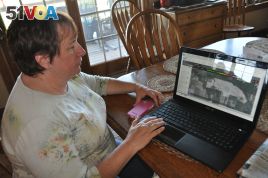07 July, 2014
51VOA听写整理,转载请注明出处。文本仅供参考,欢迎纠错!
From VOA Learning English, this is the Agriculture Report.
Farmers are increasingly using high-tech products to lower their costs, increase the amount of crops they grow and add to their profits. But they are not just using high-tech machines. They also now employ services that gather information about their farms to improve their businesses.
The Finfrock family grows corn and soybeans on about 3,200 hectares in the Midwestern state of Illinois. Shelley Finfrock and her husband use technology to operate the large farm with just their son and one employee. But Ms Finfrock says technology can not control everything.

Shelley Finfrock has been testing Climate Basic to check the accuracy of its rainfall estimates and other features. (V. LaCapra/VOA)
"Weather's probably the most important thing, and the most uncontrollable thing," Finfrock said.
She says weather affects every part of a farm, including the soil, animals that eat the crops and crop production. She says all these affect profit.
The soil in the field near the farm house looks and sounds dry. But below the surface, it has enough water to let corn seeds begin to grow. The amount of rain that falls can differ greatly from field to field on the farm.
The Finfrocks farm in five counties, checking water levels and other conditions on such a large spread can take a lot of travel time. So for the past year, Ms Finfrock has been testing an online service called Climate Basic.
The service sends her a text message very early in the morning. It tells her how much rain fell on her farms in the past 24 hours. It measures to the hundredths of a centimeter. She says the service has worked so far.
"We have a farm from where we're sitting right now, just a mile south, and it'll say it was dry, and you got a good half inch rain [up here], and you go down there and it's dry. So it was a pretty good tool to use," Finfrock said.
Tristan D'Orgeval works at Climate Corporation which developed the Climate Basic program.
"We are dealing every day with more than 10 million points for precipitation, updated on an hourly basis," D'Orgeval said.
Mr. D'Orgeval says the company uses data from the National Weather Service and other sources.
"Including radar, rain gauges and satellites, to have the best picture of the rainfall on a field-per-field basis," D'Orgeval said.
Climate Corporation released a more complex version of its program this year called Climate Pro. It hopes the program will help farmers decide what to plant, and when to use chemicals that improve growth and kill insects. The program will even tell them how much money they might make.
And that's the VOA Learning English Agriculture Report. I'm Christopher Cruise.